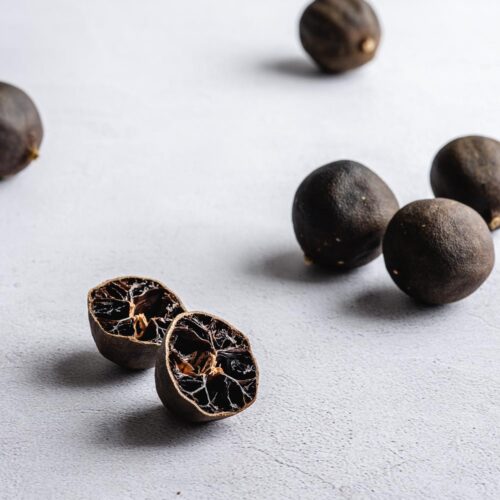
Black limes (dried limes) are fresh limes that are blanched and dehydrated until light in weight and dark brown in colour. Dry the limes in the sun, oven or a dehydrator.Once dried, the limes will keep for months stored at room temperature in a sealed container. It is well worth making a large batch of dried limes. Add a whole black lime to soups and stews in need of a citrus kick. Or grind it into a powder that is ready to sprinkle on any salad, stew or grain.Still don't know what to do with homemade black limes? See the Non-Guilty Pleasures blog post section on how to use black limes.
Servings10 dried limes
Equipment
- No special equipment is required to dry the limes. It can be dried in the sun if it is hot enough. You will need to rely on your oven's lowest setting in the cooler months. Though, if you do have a dehydrator, it should be able to get the job done in no time. A spice grinder or blender is handy if you want to make black lime powder.
Ingredients
- 10 fresh limes, preferably Persian limes or other thin-skinned seedless cultivars
- sea salt
Instructions
- Add water – enough to cover the limes – to a pot with 1 teaspoon sea salt per 1 litre of water. Bring the salted water to a rolling boil without the limes.
- While the water is heating up, get your ice bath ready by placing at least 10 blocks of ice and cool water in a container with enough space to hold the limes.
- Once the salted water in the pot reaches a boil, add the limes for 60 to 90 seconds.
- Remove the blanched limes with a slotted spoon and drop them into the ice bath to stop the cooking process. Leave the limes in the ice water until cool. Once ready, remove the limes and dry with a clean tea towel. Give shop-bought limes a good rub in case they still have some wax residue on them.
- To dry the limes, you can place them in direct sun during summer when it's properly hot outside. Alternatively, place the limes directly on your oven bars with the oven set to a low temperature, I use 70 °C (158 °F) in a non-fan oven. Use any temperature between 65 °C and 95 °C (150 °F - 200 °F) and dry until the limes are dark brown and hollow, or continue until almost black. It takes between 2 and 5 days depending on the method used.
- Once dried, store whole limes in an airtight container at room temperature. It will keep for several months. Or for ground black lime powder, bash the limes into a few pieces with a skillet. Remove any seeds and grind into a powder using a spice grinder, blender or mortar and pestle. Store it in a sealed container and sprinkle on everything!
Notes
- IMPORTANT: I always turn the oven off when unsupervised, i.e. when I leave the house or go to bed. Use your own judgement to determine what is safe in your environment.
- I use a combination of sun and oven drying, making use of any residual heat from dinner or the day's baking. And I always turn the oven off before going to bed or leaving the house. This way it takes me roughly 3 days.
- Place the limes directly on the oven bars or a cooling rack when drying outside. This encourages air circulation. And remember to rotate the limes every now and then to ensure even drying.
- If you need to use your oven while it's occupied by your limes, simply remove the limes and place them back in the oven once you are done baking and the oven has cooled down to a suitable temperature.
- If I know I'm going to grind my dried limes, I let them dry out until almost black and very light in weight. On the other hand, if I know they are going to be used whole very soon, I stop when they are brown so that they are easier to pierce. For longer storage, I always dry them out until very dark and hard.
- Soften a rock hard black lime in boiling water before piercing. Just remember to use that wonderful citrusy water in a stew or to boil rice.